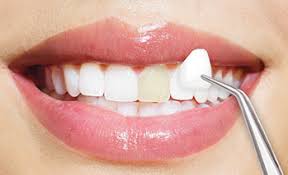
- Since they require approximately 0.5 mm of tooth reduction, porcelain veneers are not considered a reversible form of treatment.
- Occasionally, the preparation of a porcelain laminate veneer does not necessitate the use of a local anesthetic. However, for those patients that are particularly sensitive or anxious, a local anesthetic is advisable.
- The laboratory time required for the fabrication of a porcelain laminate veneer is approximately one week, although this may vary.
- You can expect some sensitivity to hot and cold. This is normal and is due to the removal of a small portion of the tooth’s enamel covering. This sensitivity should disappear a few days after the placement of the veneers.
- The insertion or cementation of your laminate veneers can be accomplished once again with or without local anesthetic. This visit is usually longer in length. The laminates are placed with a light-sensitive resin hardened with the use of a white light, effectively bonding them to your teeth.
- Once placed, your laminate veneers are very strong and will resist most of the forces placed upon them by a normal diet. Porcelain is a glass and like glass it is strong, but brittle. Therefore, you should avoid anything that will tend to stress the laminate veneer. Opening pistachio nuts with your teeth, chewing on bones or candy apples is probably not a good idea. As with most things, common sense should prevail.
Visit our dental clinic in pune, SmyleXL dental facility to discover progressively about dental problems
Maintenance of Your New Porcelain Veneers
The maintenance of your porcelain laminate veneers is relatively simple. Here are some recommendations:
- Brush and floss as you normally would to prevent dental problems. Porcelain veneers are one of the kindest restorations to gum tissues that we currently have in dentistry. Don’t be afraid of damaging your laminates by either flossing or brushing. Any non-abrasive fluoride toothpaste is acceptable. A good home care regimen will insure the esthetic success of your laminate restorations for years to come.
- If you are known to be a bruxer or clencher, i.e. you have a habit of grinding your teeth, please let your dentist know. He or she will fabricate a protective “occlusal” or bite guard for you to wear to minimize the stresses placed upon your teeth while you sleep.
- Approximately one week after the placement of your laminates you will be asked to return to the office for a treatment evaluation. This visit is extremely important. It gives your dentist the opportunity to evaluate the placement of the laminates, the gum tissue response and to answer any questions you might have regarding your new smile. Regular maintenance and dental check ups are recommended so that your veneers and oral health can be reviewed periodically.
Frequently Asked Questions About Veneers
- What happens to my teeth after veneers, and will I ever get cavities?The integrity of veneered teeth is only marginally compromised, and the veneer is bonded to the existing teeth. There is no higher incidence of decay provided the veneers are properly cared for as previously mentioned with regular flossing and brushing with toothpaste. In general, it is good dental advice to keep your sugar consumption low and confined to meal times to prevent decay.
- How long will porcelain veneers last?They can last from seven to twenty years. While the veneer itself is inert and non-living, the tooth or teeth to which they are attached and the surrounding gum tissues are living and may change. For example, gum line shrinkage may expose or reveal root surfaces. If a veneer comes off it can generally be rebonded. If it chips it can sometimes be rebonded or otherwise replaced.
- If I have my upper teeth treated with porcelain veneers, will my lower teeth still be a different color, or more yellow?This is certainly a factor that will be discussed during your evaluation and smile design so that everything matches and blends well. Most patients usually whiten the lower teeth with whitening (bleaching) procedures to ensure a good match.
- Do porcelain veneers stain with normal things like tea, coffee and wine?Porcelain veneers should never stain; however; if your teeth have a propensity to stain you should try to avoid or minimize the behaviors that lead to staining and look after them as recommended above with normal hygiene and maintenance procedures.
- Does dental insurance cover porcelain veneers?Some insurance companies will cover up to 50% of the fee they deem customary. However, it depends upon what your employer has contracted for with your insurance company rather than what your dentist is charging. Don’t forget your dentist also has to pay the dental technician who actually fabricates the veneers, a critical component in the fee.
source: deardoctor